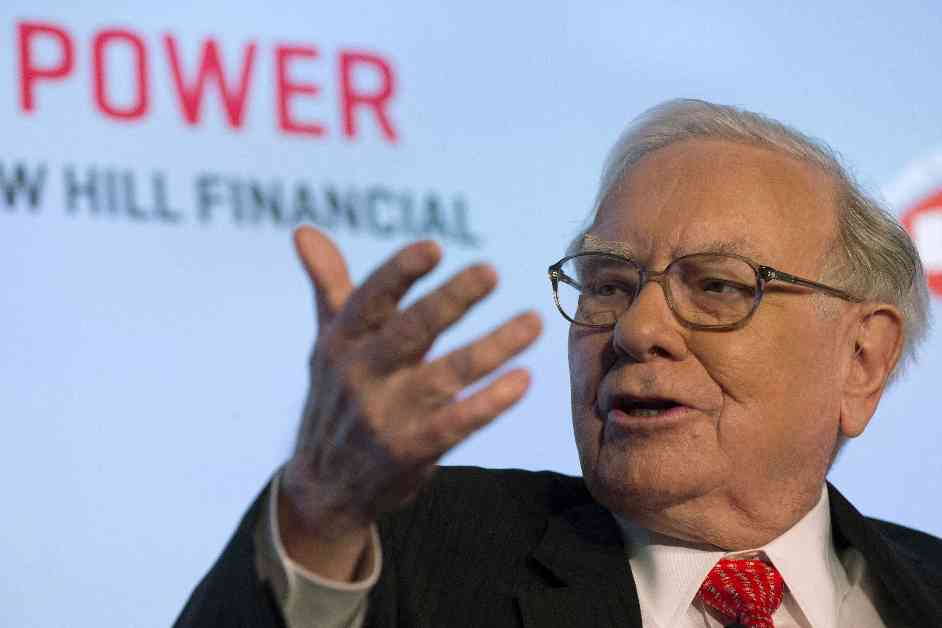Warren Buffett, also known as the “Oracle of Omaha” and widely regarded as the “Stock God,” celebrated his 94th birthday on August 30. With a remarkable investment career spanning 83 years since he started buying his first stock at the age of 11, Buffett has accumulated a wealth of life experience and investment wisdom.
One of Buffett’s most notable investment strategies is his willingness to invest billions of dollars in undervalued companies and hold onto them for the long term. Under his leadership since 1965, Berkshire Hathaway has grown into a massive investment conglomerate, recently becoming the ninth company in history to surpass a market capitalization of $1 trillion.
When Buffett first invested in Berkshire Hathaway in the 1960s, the stock was trading at around $8 per share. By July of this year, the Berkshire Hathaway Class A shares, which have never undergone a stock split, had soared to $620,000 per share. This remarkable growth highlights Buffett’s ability to identify value and hold onto investments for significant returns over time.
Buffett’s investment style is characterized by his ability to learn from failures and setbacks. While Berkshire Hathaway has made mistakes in the past, such as the unsuccessful investment in General Motors that led to a complete divestment by the end of 2023, Buffett’s overall track record of success speaks for itself. Over the past 40 years, Berkshire Hathaway’s Class A shares have delivered an annualized return of 17%, outperforming the S&P 500 index’s 11% return during the same period.
In addition to learning from failures, Buffett also emphasizes the importance of holding onto cash when opportunities in the market are scarce. Despite criticism of holding large cash reserves, Buffett believes that having cash on hand during turbulent market conditions can provide a competitive advantage. Currently, Berkshire Hathaway’s cash position has reached nearly $200 billion, a record high, with Buffett indicating that he is waiting for the right opportunities to deploy these funds effectively.
While Buffett advocates for long-term investing, he also recognizes the importance of adapting to changing circumstances. For example, his investment in Bank of America’s preferred stock in 2011 to support the struggling financial giant was a departure from his previous stance on investing in banks. Similarly, Buffett’s decision to reduce Berkshire Hathaway’s stake in Apple by over 50% this year demonstrates his flexibility in adjusting his investment strategy as needed.
Another key lesson from Buffett is the importance of investing in high-quality companies rather than focusing solely on the CEO. Buffett believes that investing in companies with strong fundamentals, even if they are run by less-than-stellar management, can lead to long-term success. This principle is particularly relevant in today’s market environment, where charismatic CEOs like Mark Zuckerberg of Meta, Jensen Huang of Nvidia, and Elon Musk of Tesla attract significant attention from investors.
Lastly, Buffett’s emphasis on the power of compound interest underscores the importance of holding onto investments for the long term. His famous quote, “If you aren’t willing to own a stock for ten years, don’t even think about owning it for ten minutes,” highlights the value of patience and long-term thinking in investing. By harnessing the power of compound interest, Buffett has been able to grow his wealth significantly in his later years, showcasing the simplicity and effectiveness of this investment strategy.
In conclusion, Warren Buffett’s 94th birthday serves as a reminder of the timeless investment principles that have guided his success over the years. From learning from failures to adapting to changing market conditions and emphasizing the power of compound interest, Buffett’s investment strategies offer valuable insights for investors seeking long-term financial growth. As the “Oracle of Omaha” continues to inspire investors worldwide, his birthday reflection serves as a testament to the enduring wisdom of his investment approach.












